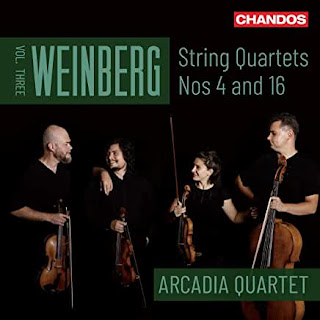by Ryan Ross
Weinberg: String Quartet No. 4 in E-Flat Major, Op. 20; String Quartet No. 16 in A-Flat Minor, Op. 130. Arcadia Quartet. Chandos CHAN 20180
I admit it: I don’t know what to make of Mieczysław Weinberg’s music on the whole. And the more I listen to it, the more my bemusement deepens. Often I’ll be strongly reminded of Shostakovich, with more than a few works striking me as interesting, competent, and yet ultimately inferior to the more famous composer’s finest. But sometimes I’m completely won over by what I hear. When this happens, any Shostakovich influence that may be present recedes to irrelevance. Maybe Weinberg had more individuality than I give him credit for, maybe his inspiration was of an intermittent kind (his inconsistency can run from movement to movement, and not just work to work), or maybe there’s some other “IT” factor at play. I can’t tell. In any case, I remain willing to listen to more nice but scarcely memorable music by him in search of the occasional stretch to which I’ll eagerly keep returning. (I still play the first movement of his Third Symphony on repeat, years after my first hearing.)
The third volume of Weinberg string quartets by the Arcadia Quartet on Chandos encapsulates my dilemma. It features his Fourth Quartet (1945) and his Sixteenth Quartet (1981). The Fourth Quartet is an absolutely stunning piece of music; it’s a new favorite that for me holds its own in any (yes, any) company from a crowded literature. The first movement is of a somewhat pastoral character, with a gently lilting theme and scalar figure that give it a bittersweet flavor. A punchy, flavorful scherzo follows. David Fanning’s terrific liner notes rightly identify Prokofiev, and not just Shostakovich, as an influence here. But there’s definitely an added “something” that provides a special kick, perhaps helped by extended string techniques contributing to a feeling of artful garishness. Something like a dirge occupies the slow movement slot, beginning with an earworm main theme that recurs in different contexts throughout. But perhaps the most powerfully emotional juncture is the rondo-ish finale. It opens with a portentous figure featuring chords in the bass and rising arpeggios in the treble. Such a description cannot do justice to how affecting I find this idea. Other descriptions of the Fourth Quartet identify its childlike qualities, and nowhere would I agree more than here. As a child might, I didn’t know whether to be allured or disturbed. I’m going to use an overly-used label and call this entire, thoroughly consistent work a masterpiece.
From the get-go, we hear that the Sixteenth Quartet is a rather more austere work. An expertly crafted opening proceeds from a forceful theme on the first violin that gets taken up in the other instruments. The next movement seems to be a kind of scherzo, the outer sections of which make use of a rapid and dissonant motive that also gets passed from instrument to instrument. (This movement reminds me a bit of the conclusion to Britten’s Second Quartet.) The inner section here features an angular, mournful melody over shifting chords. While the whole work smells of late Shostakovich, the slow movement in particular sounds like it could have been taken from an undiscovered quartet by DSCH. It has craft, even feeling, but to my ears lacks both strong thematic interest and character of its own. The dance-like rondo finale comes across very similarly: it not so much stands on the shoulders of a giant as it is carried by them. I was rooting for this Sixteenth Quartet to be at least as compelling as the Fourth, especially given the former’s dedication to the composer’s sister, a victim of World War II. It’s certainly well composed and interesting. But I am going to have to place this work in the “scarcely memorable” category. When I want Swan Song Shostakovich, I’ll go for the real McCoy. Still, the Arcadia Quartet provides fervent advocacy, not to mention a special message from the performers to that effect in the liner notes. Other listeners’ mileage may vary from mine. I hope that it does.
This pairing of the Fourth and Sixteenth Quartets directly competes with performances by the Quatuor Daniel (CPO 777313-2). Having heard both recordings, as well as the same works done by the Silesian Quartet on the Accord label (ACD 291 and ACD 284), I recommend this Chandos recording on account of its sound quality and the Arcadia Quartet’s expressivity. But Weinberg enthusiasts are now fortunate to have several good options. Will they ever have more, including in the concert hall? I look forward to seeing whether and when this quartet cycle ever achieves a status that the best music in it deserves. Maybe by then I’ll have changed my mind about some of the rest of the cycle.




No comments:
Post a Comment
Thank you for your comment. It will be published after review.